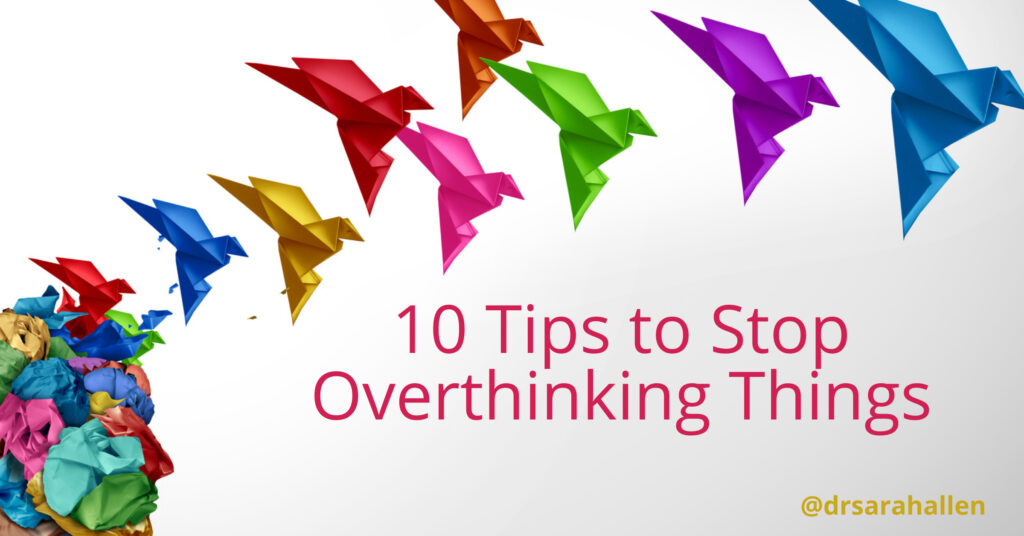
It’s natural for people to revisit past events or worry about the future from time to time. However, when overthinking becomes a constant presence, it can negatively impact one’s emotional well-being, relationships, and life satisfaction. Breaking free from the overthinking cycle is crucial to thriving in both our personal and professional lives. As an experienced anxiety therapist, I understand the challenges of overcoming overthinking and the toll it can take on overall happiness and well-being.
In this article, I will provide you with 10 useful tips to help you stop overthinking. By incorporating these tips into your daily routine, you will learn to embrace a more balanced thought process, find relief from anxiety, and ultimately, a less stressed life. So, let’s get started on your journey to a clearer, calmer, and more present-focused lifestyle!
1. Recognize and Acknowledge Overthinking
The first step in combating overthinking is to recognize when it is happening. Pay attention to repetitive thoughts, excessive worry, and analysis paralysis, which can hinder decision-making. Once you become aware of these patterns, you can begin to take proactive measures to address them.
2. Create a Structured Time for Reflection
Setting aside a designated time for self-reflection can be helpful in managing overthinking. Reserve a specific part of your day to intentionally reflect on your thoughts and concerns. Limit this period to avoid obsessing over issues, and focus on productive problem-solving rather than rumination. Establishing a structured reflection time can prevent overthinking from seeping into other areas of your life. It might be hard to stop negitive thoughts from popping into your brain when you are going about your day but telling your brain that you are going to think about things at a specified time can help you to stop ruminating on it. Cognitive Behavior Therapy (CBT) can help people think in a structured way as it names common ways of thinking that can be unhelpful. For example, you can ask yourself “am I catastrophizing?” which is when we magnify the importance or impact of a situation and assume that the worst possible outcome is going to happen. “Mental filtering” is when we only focus on the negative aspects of a situation while ignoring the positive ones or the bigger picture or we might be able to catch ourself thinking about things in an all or nothing way. These are just a few examples of unhelpful thinking patterns and more about CBT and negitive self-talk can be read in my article What Is CBT? A Simple Guide To Understanding Cognitive Behavioral Therapy.
3. Use a Worry Journal to Track and Challenge Patterns
A thought diary can be a helpful tool to use during your structured time for reflection and for identifying patterns of overthinking and challenging them. By writing down your thoughts, concerns, and emotions, you bring structure to the process, allowing you to analyze and challenge irrational thoughts. In addition, you can identify recurring themes and implement proactive solutions to address them, thus reducing overthinking. To read more about the science behind how a worry journal works and the different types so you can find the right fit, read Discover How A Worry Journal Can Help Reduce Your Anxiety.
4. Establish Realistic Expectations
Unrealistic expectations can fuel overthinking and create unnecessary pressure on yourself. Be compassionate with yourself, and remember that perfection is unattainable. Instead, focus on setting achievable goals and taking small, actionable steps towards those objectives. By adopting realistic expectations, you can alleviate the anxiety that often accompanies overthinking. Perfectionist thinking often goes hand-in-hand with anxiety and if you find that you tend to be a bit of a perfectionist I have two articles that you may find helpful: Overcoming Perfectionism and The Connection Between Perfectionism & Anxiety.
5. Practice Mindfulness Techniques
Mindfulness techniques can help train your mind to focus on the present moment and quiet overthinking. Practices like deep breathing, meditation, or progressive muscle relaxation help you develop an awareness of your thoughts and emotions. Encourage a non-judgmental, accepting attitude during these mindful exercises, allowing you to observe your thoughts without getting caught up in them.
6. Break Large Tasks into Manageable Steps
This might sound simple but having to get things done can often feel unmanagable . Overthinking can be amplified when tasks or decisions appear overwhelming and we don’t know where to start. Break larger tasks into smaller, manageable steps makes them feel less daunting. Think of where you are now in the process and what the end goal is. Then break down the different components what need to happen to reach the end goal and how long each step is likely to take. It is much less overwhelming to tackle a small step that it is to get everything done. This approach reduces the tendency to overthink, making it easier to tackle challenges one step at a time.
7. Limit Exposure to Anxiety-Provoking Stimuli
Begin my noticing if certain things throughout your day/week tend to increase your anxiety. Understanding what triggers your anxiety and overthinking is crucial to addressing it effectively. I often hear from my clients that the news or watching violent shows increases their anxiety. Or maybe you feel worse after being on social media and seeing what other people are doing and comparing yourself or your own situation to them makes you feel bad about yourself. Does spending time with certain people in your life make you feel worse. I call these people energy vampires because you feel drained after being with them. By limiting your exposure to anxiety-provoking stimuli – this may include reducing time spent on social media, watching the news, or engaging in draining conversations you can feel less anxious. Creating a positive and supportive environment for yourself as much as possible can really help prevent overthinking from becoming an all-consuming habit.
8. Schedule Worry-Free Leisure Activities
Building upon tip 7 to try to limit anxiety-provoking stimuli, engaging in enjoyable activities is a positive way to disrupt the overthinking cycle because it redirects your focus to positive experiences and feeling happier. Schedule fun activities that bring you joy, or at least some enjoyment, relaxation, or a sense of accomplishment, examples can include exercise, socializing, hobbies, or simply spending time in nature or engrossing yourself in a good book. These all have the possiblity to provide some balance and promote emotional well-being.
9. Reach Out to a Supportive Network
It can be hard to stop overthinking things and stopping the thoughts going round and around your brain can seem imposible. However, getting those thoughts out and talking through your concerns with someone you trust can help mitigate the tendency to overthink. Connecting with supportive friends, family members, or a therapist can be highly beneficial in managing overthinking as they can offer different perspectives, facilitate problem-solving, and provide emotional validation and reassurance. Avoid people who are judgemental or want to tell you what to think instead and rely on people who help you come to your own conclusions.
10. Seek Professional Help
If overthinking becomes chronic and consistently impacts your daily life, seeking professional help is advisable. As an experienced anxiety therapist, I can work with you to identify the underlying issues contributing to your overthinking patterns and provide personalized strategies to help you regain control over your thoughts and emotions.
By incorporating these tips into your daily routine, you can reduce overthinking and foster a healthier, more balanced mindset. Remember to be patient with yourself, as change takes time and consistent effort, but the long-term benefits of breaking the cycle of overthinking can be truly transformative for your overall well-being and certainly reduces the stress of thinking about things constantly.
Taking Back Control of Your Thoughts
Overthinking can have a significant impact on your emotional well-being, relationships, and overall life satisfaction. By implementing the tips provided in this article, you can begin to break free from the grip of excessive overthinking and cultivate a healthier, more balanced mindset. Remember, change takes time and consistent effort, but with perseverance, you can enjoy a more present-focused and fulfilling life.
If you find that overthinking continues to be a persistent struggle despite your efforts, know that you don’t have to face it alone. Reach out to an experienced anxiety therapist like myself, Dr. Sarah Allen, to provide personalized guidance and support in your journey to overcoming overthinking. Together, we can explore effective strategies through anxiety counseling which will be tailored to your unique needs, empowering you to regain control over your thoughts and emotions.

If you have any questions, or would like to set up an appointment to work with me and learn how to reduce anxiety, please contact me at 847 791-7722 or on the form below.
If you would like to read more about me and my areas of specialty, please visit Dr. Sarah Allen Bio.
Dr. Allen’s professional license only allows her to work with clients who live in IL & FL & the UK and unfortunately does not allow her to give personalized advice via email to people who are not her clients.
Dr. Allen sees clients in person in her Northbrook, IL office or remotely via video or phone.

What Can I Read That Helps Me While I Am Waiting For My First Appointment With Sarah?
Download this free booklet to gain valuable insights and practical strategies for managing anxiety and worrying.



























